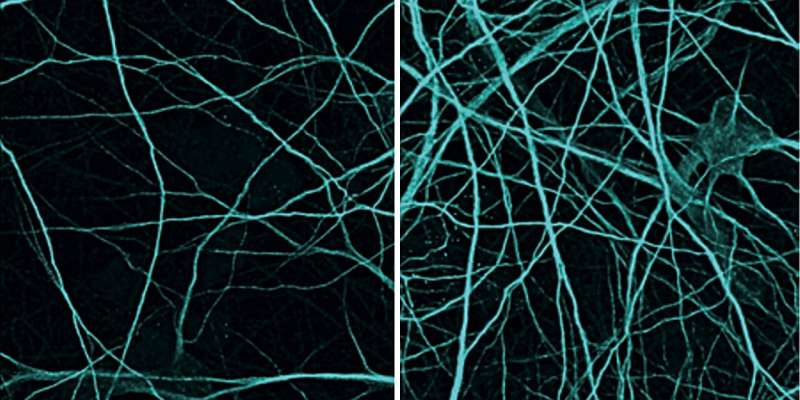This article has been reviewed according to Science X's editorial process and policies. Editors have highlighted the following attributes while ensuring the content's credibility:
fact-checked
peer-reviewed publication
trusted source
proofread
New therapeutic approach for frontotemporal dementia uses modified viruses to replace a missing protein in the brain

Frontotemporal dementia is a currently incurable brain disease causing memory loss, speech disorders, and changes in personality. In 5–12% of cases, a decline in progranulin triggers the disease. The loss of this protein leads to deficiencies in protein breakdown, resulting in the deposition of insoluble toxic proteins. This leads to inflammation of the brain, neuronal death, and associated massive functional disorders of the central nervous system.
Frontotemporal dementia is inherited in up to 40% of cases: carriers of the corresponding genetic mutation inevitably develop the disease.
Researchers at the LMU Faculty of Medicine and the German Center for Neurodegenerative Diseases (DZNE), working in close cooperation with Denali Therapeutics in San Francisco, have now developed a therapeutic approach that makes it possible to replace the missing protein in the brain.
They have published their results in the journal Science Translational Medicine.
"We inserted progranulin into the genome of a virus," explains Dr. Anja Capell, senior scientist at LMU's Biomedical Center and one of the lead authors of the paper. Next, the team injected the modified viruses into the bloodstream of mouse models.
"The virus targeted liver cells, which then produce progranulin in large quantities and release it into the blood." In this way, the approach avoids injecting viruses directly into the brain, with the associated risk of major side effects.
To get this peripheral solution to work, the researchers had to use a trick to get past the blood-brain barrier, which usually blocks the exchange of biomolecules between blood and brain. A so-called brain shuttle, developed by Denali Therapeutics, permits very effective transport across this barrier.
Strong reduction of symptoms in a mouse model
"After administering the virus once, we checked whether the symptoms were reduced," says Professor Dominik Paquet from the Institute for Stroke and Dementia Research (ISD), another lead author and member of the SyNergy Cluster of Excellence. It turned out that deficits in protein degradation, the deposition of insoluble toxic proteins, inflammation of the brain, movement disorders, and the death of neurons were all massively reduced.
"As the next step, we investigated in stem cell models whether this approach can be transferred to humans." Here, too, there was a significant reduction in symptoms of the disease. By means of this approach, the researchers were able to demonstrate that forms of frontotemporal dementia that are based on a partial loss of progranulin are treatable in pre-clinical trials using a replacement therapy.
"Such comprehensive multidisciplinary studies are possible only in a team. I'm glad that our SyNergy Cluster of Excellence offers us unique opportunities in this regard," says Professor Christian Haass from the Biomedical Center at LMU, one of the principal investigators and speaker of SyNergy.
"At the same time, this study also shows the importance of intensifying our collaboration with leading biotech companies so that we can bring our research to clinical practice as rapidly as possible for the benefit of patients."
More information: Marvin Reich et al, Peripheral expression of brain-penetrant progranulin rescues pathologies in mouse models of frontotemporal lobar degeneration, Science Translational Medicine (2024). DOI: 10.1126/scitranslmed.adj7308


















